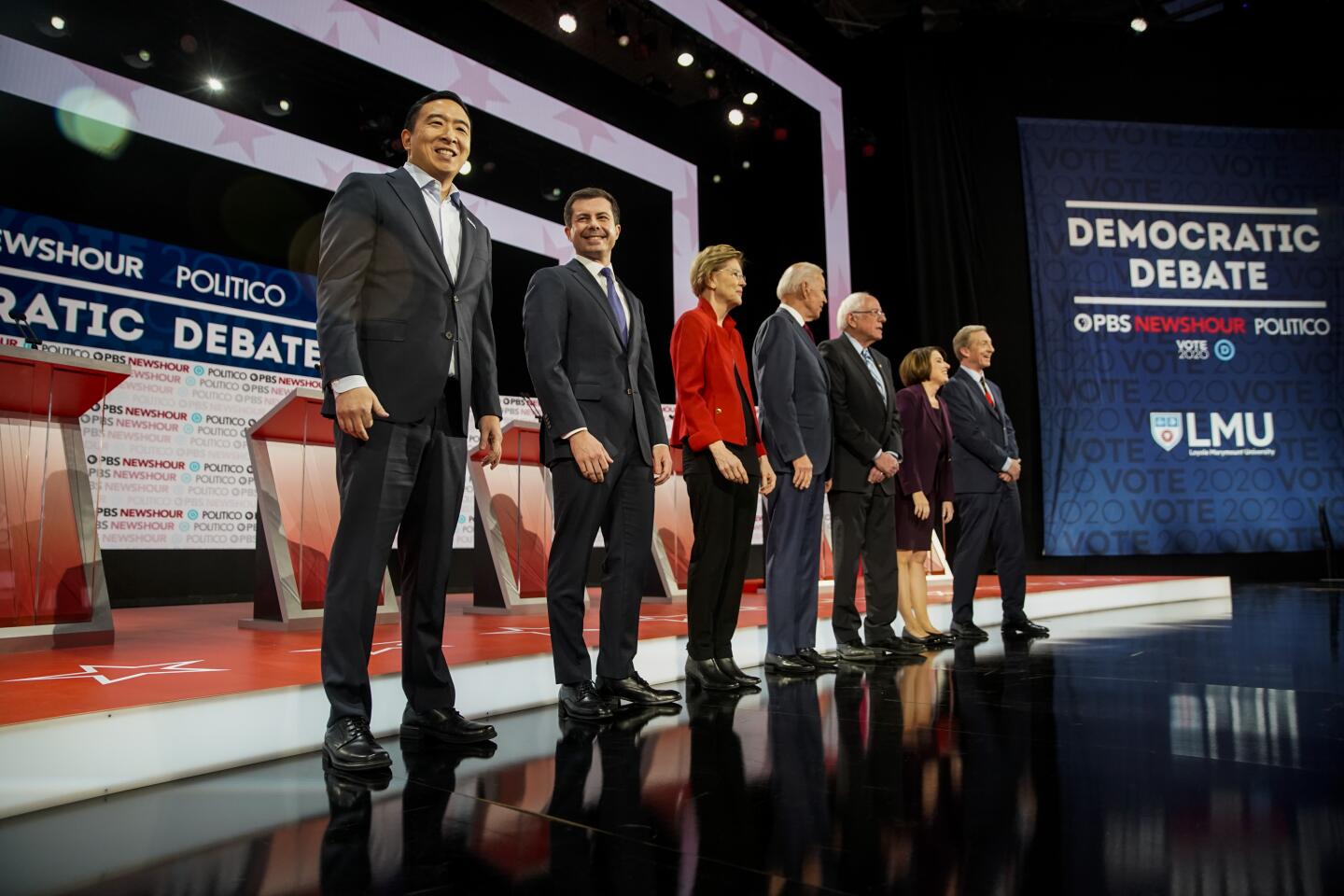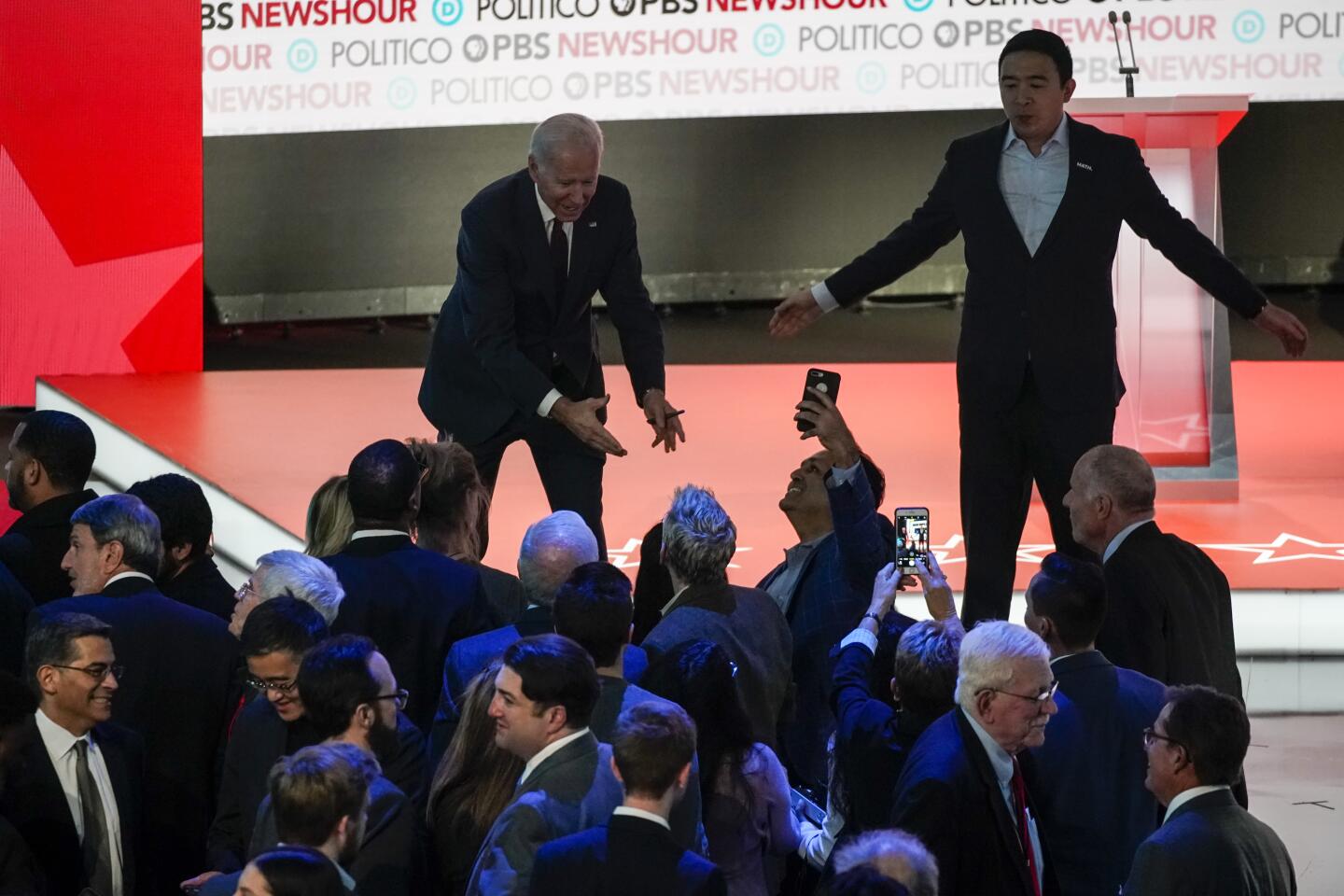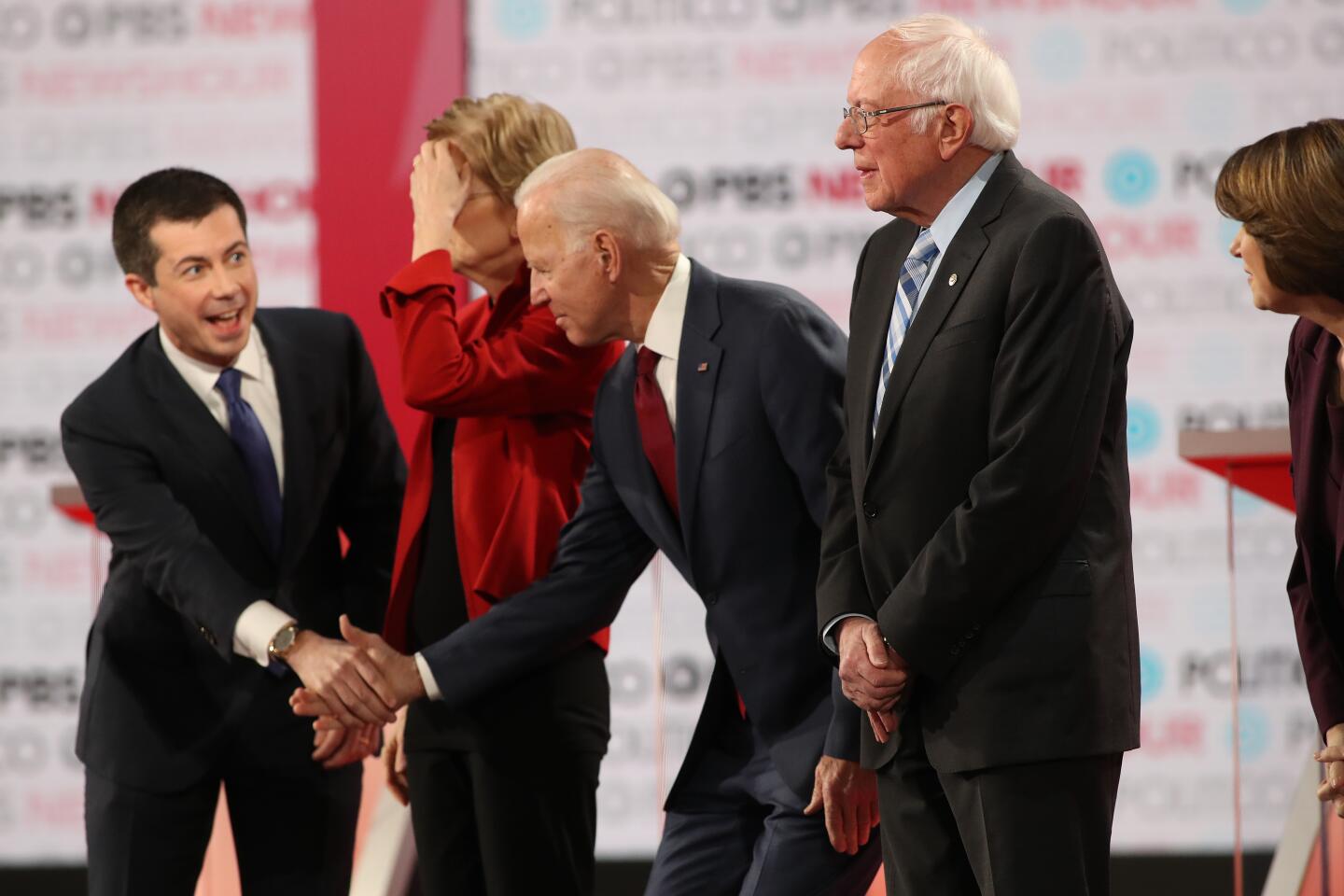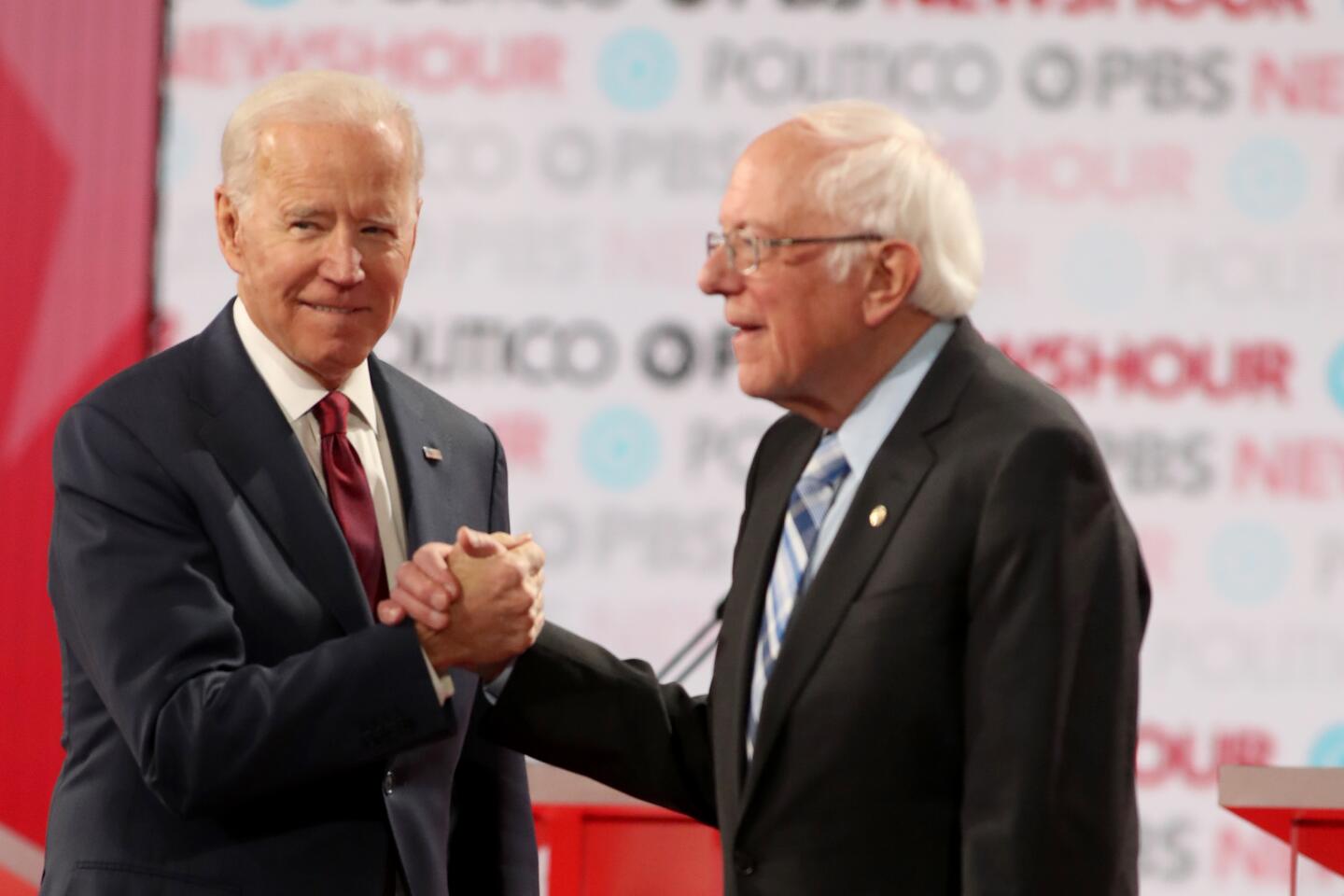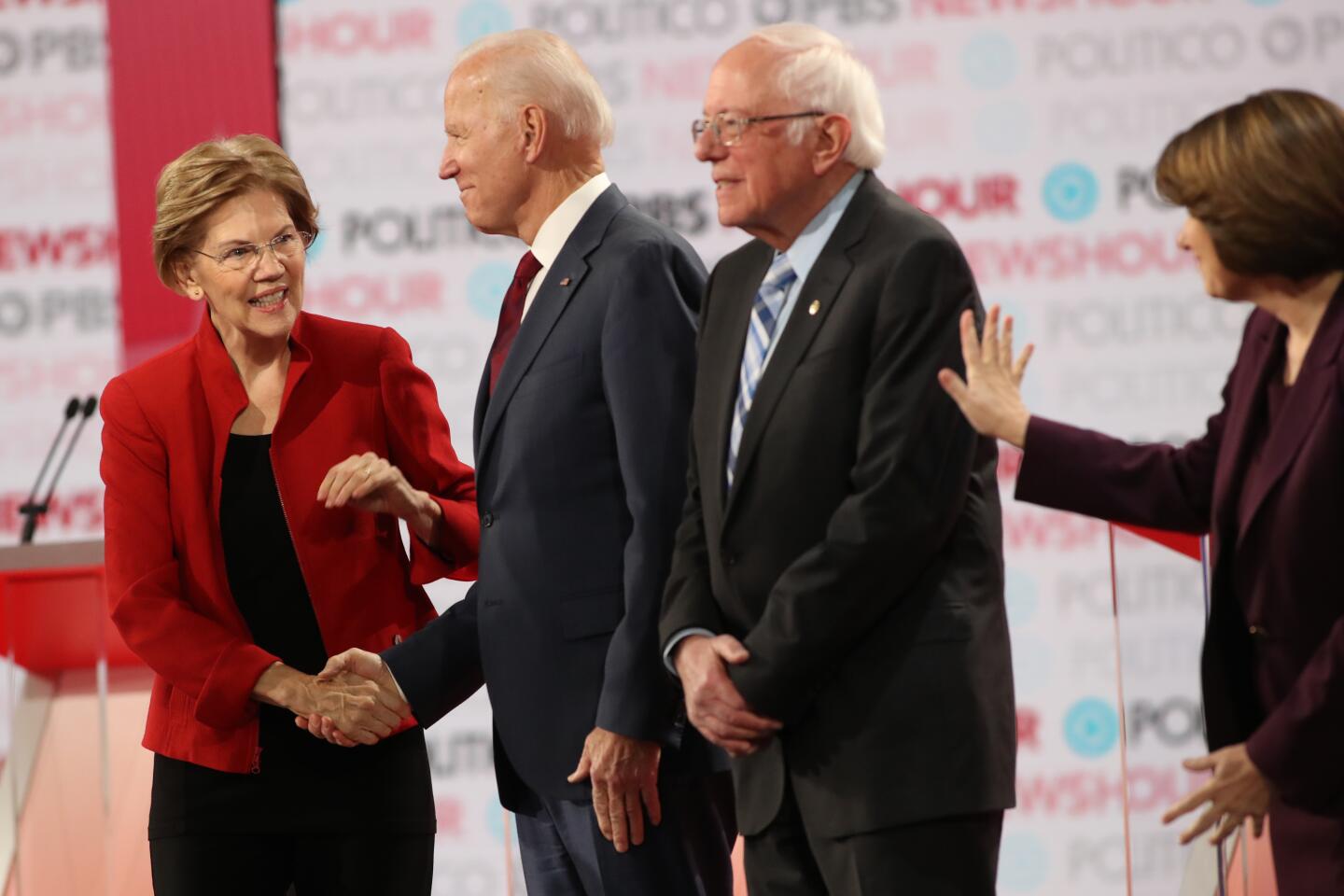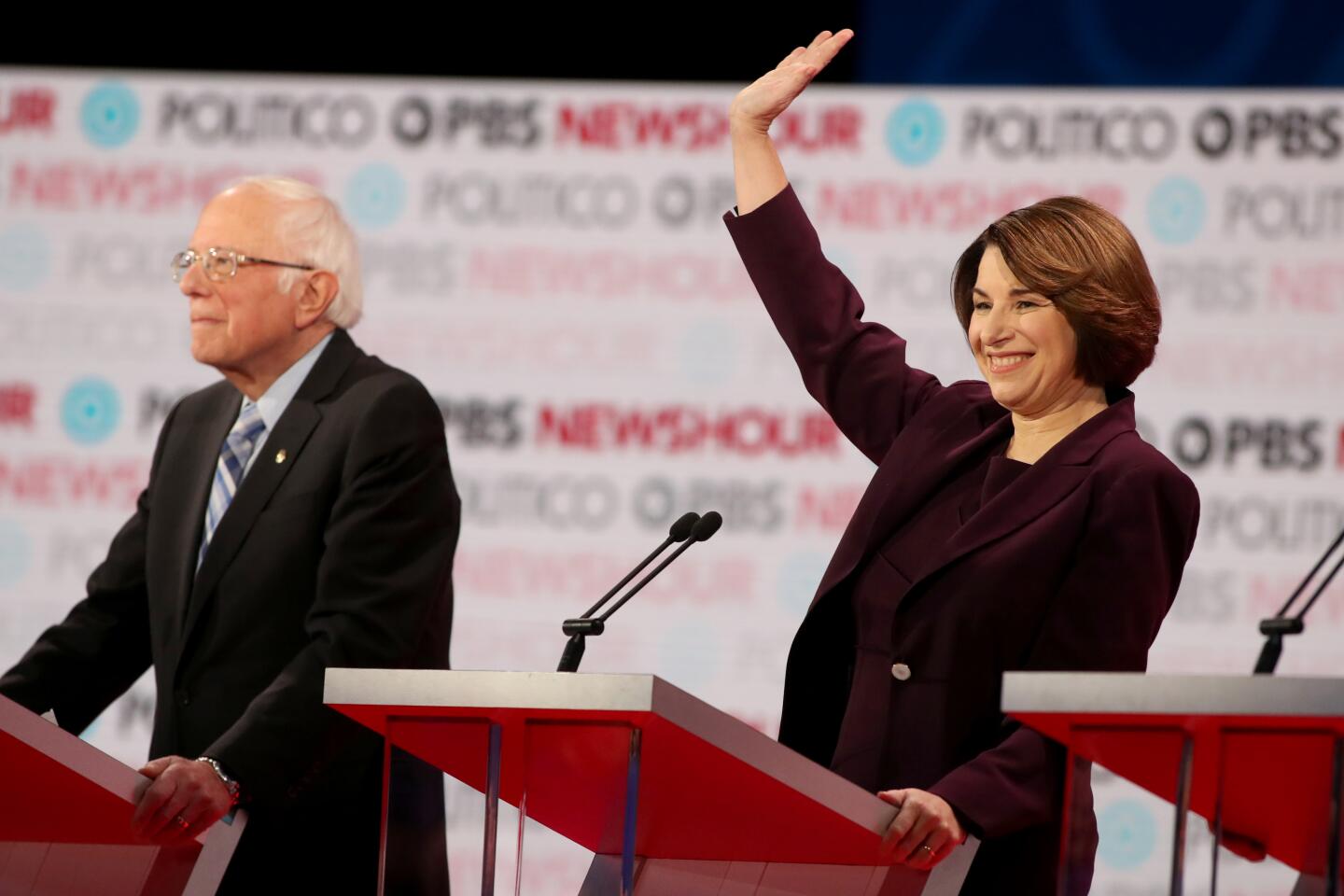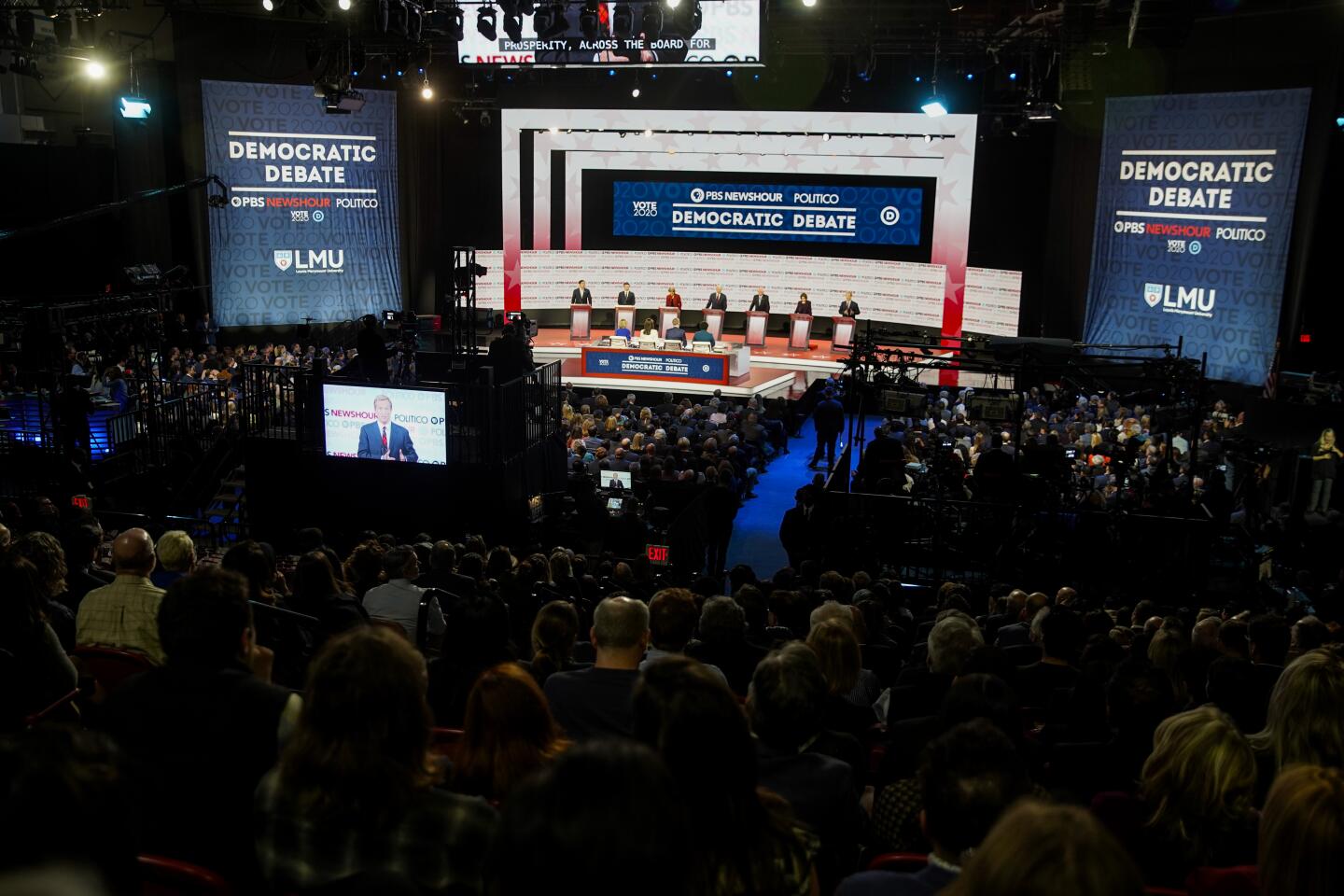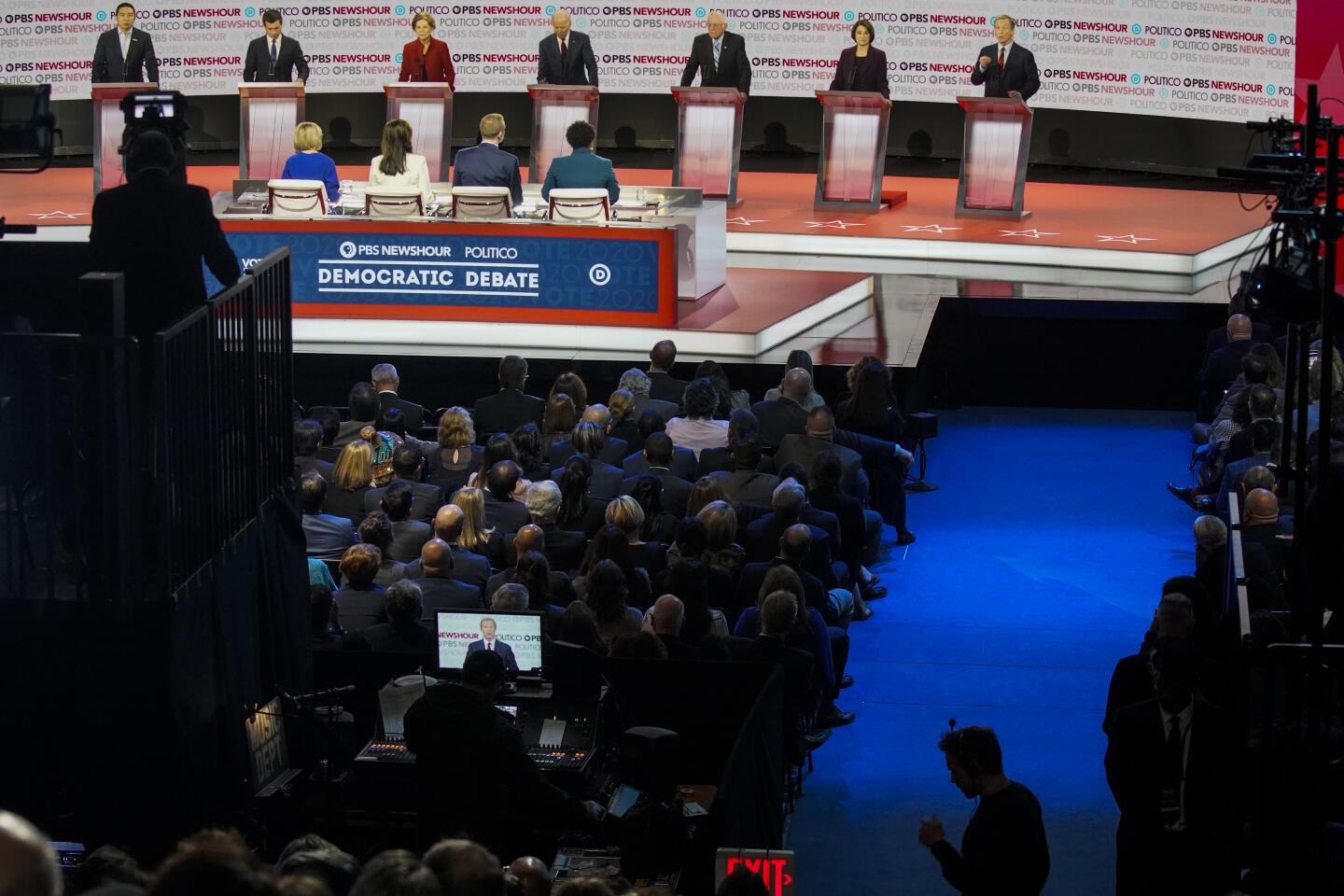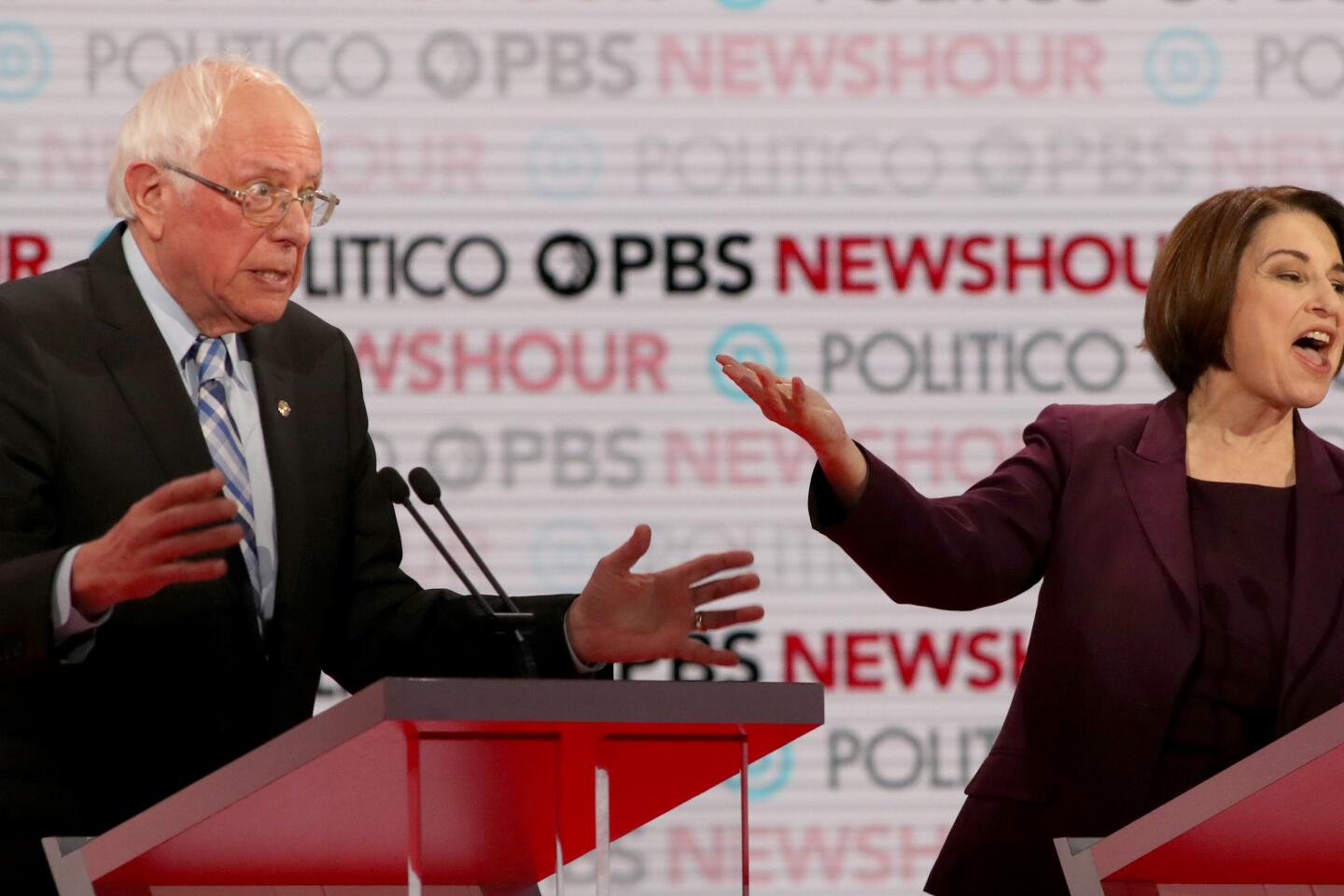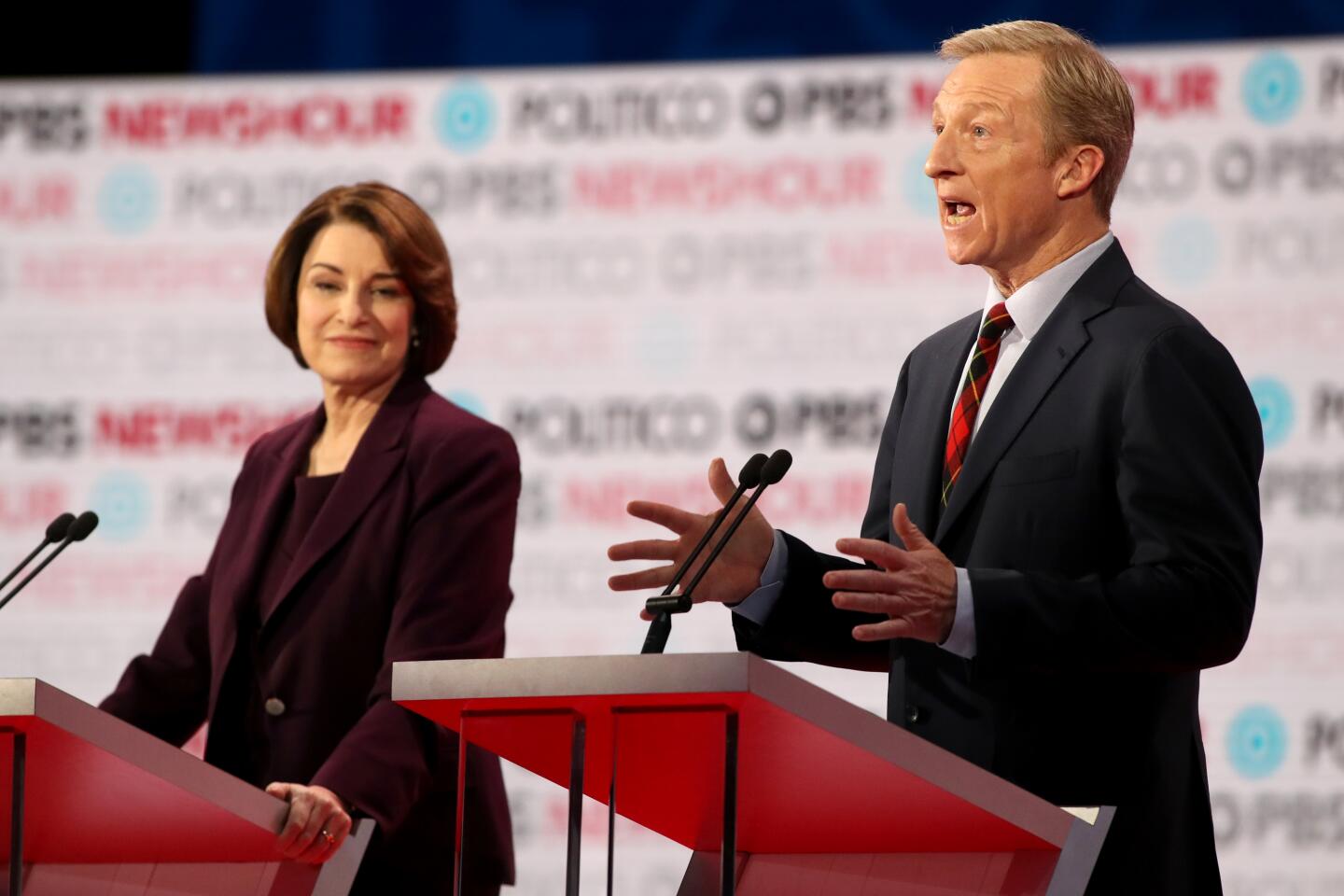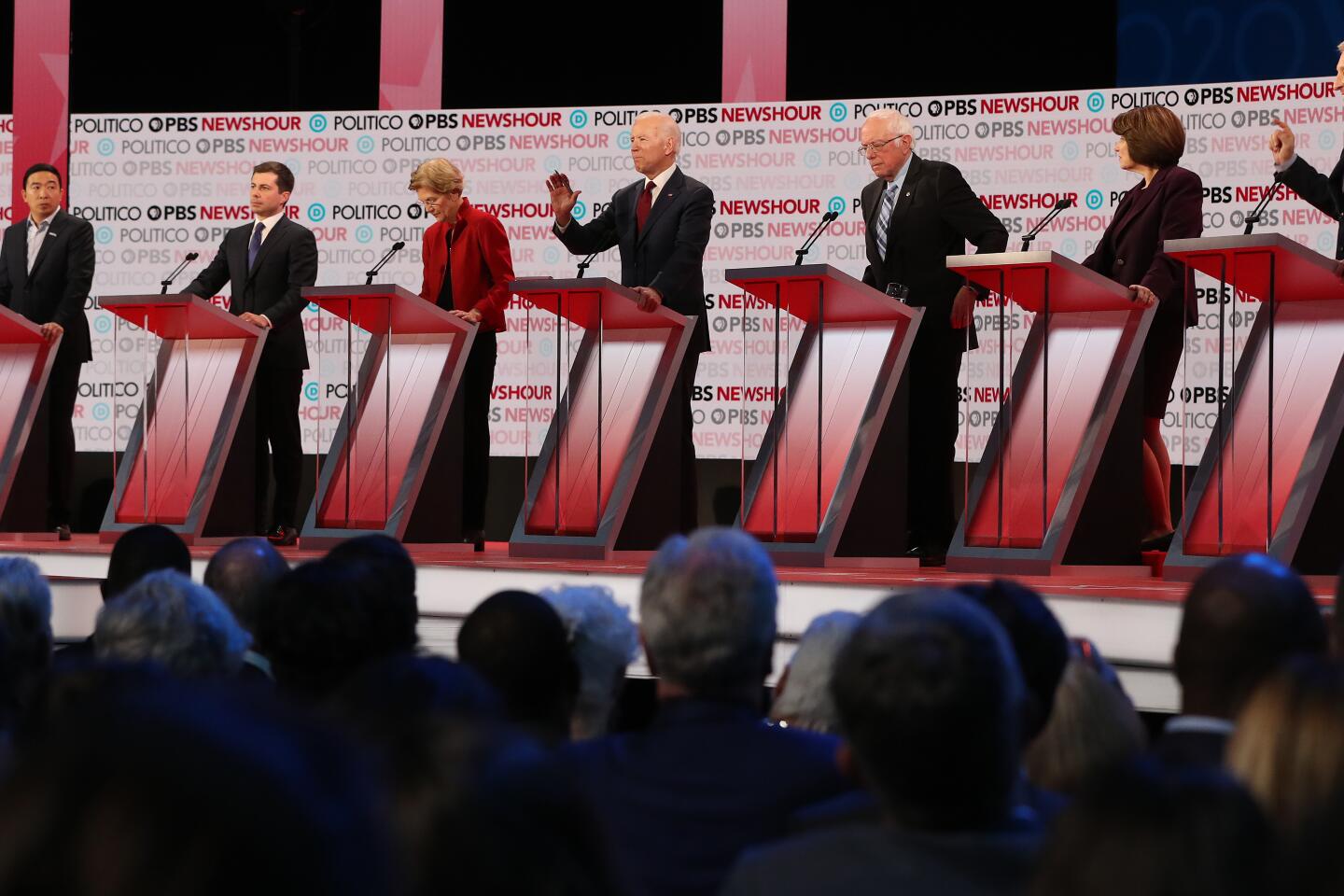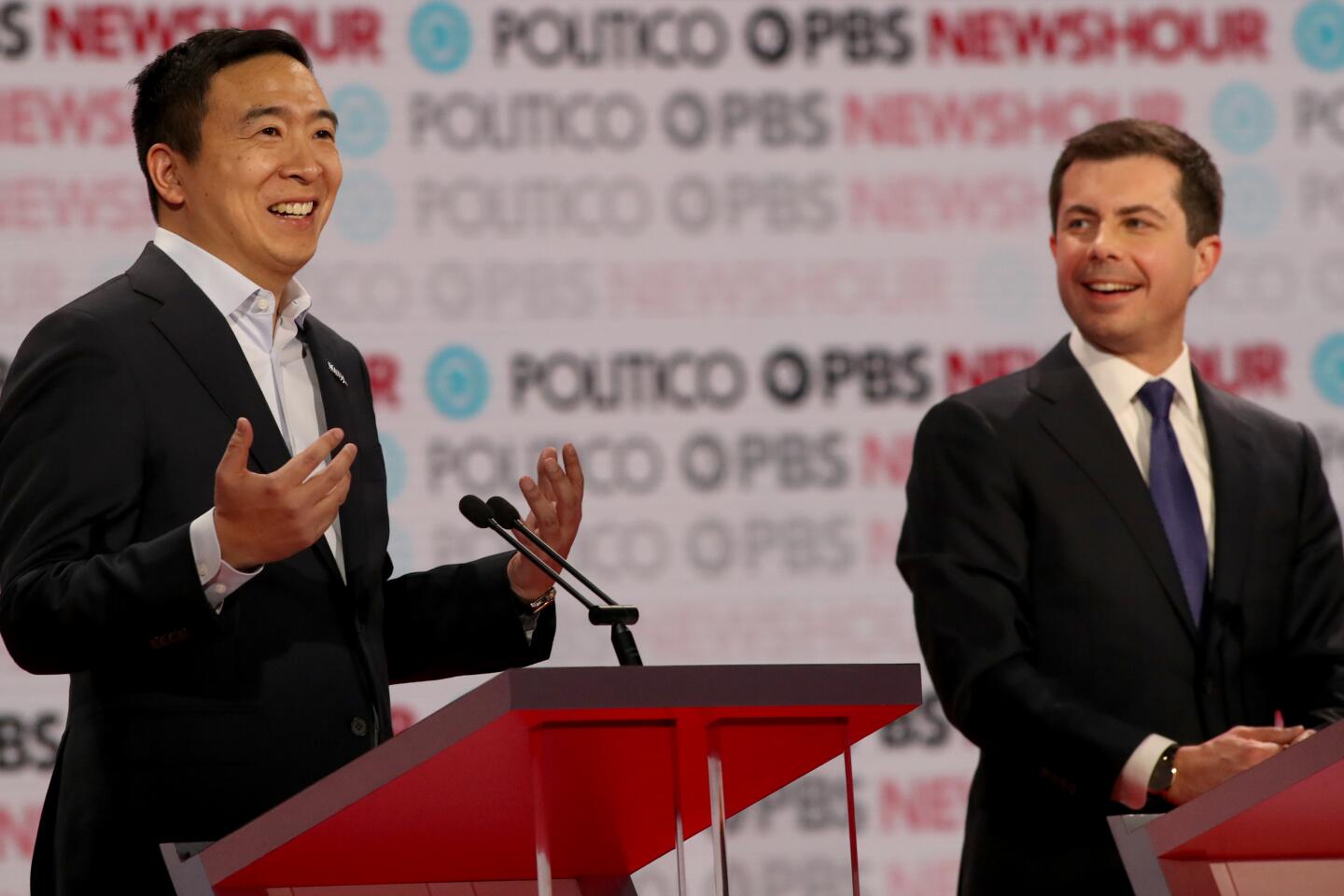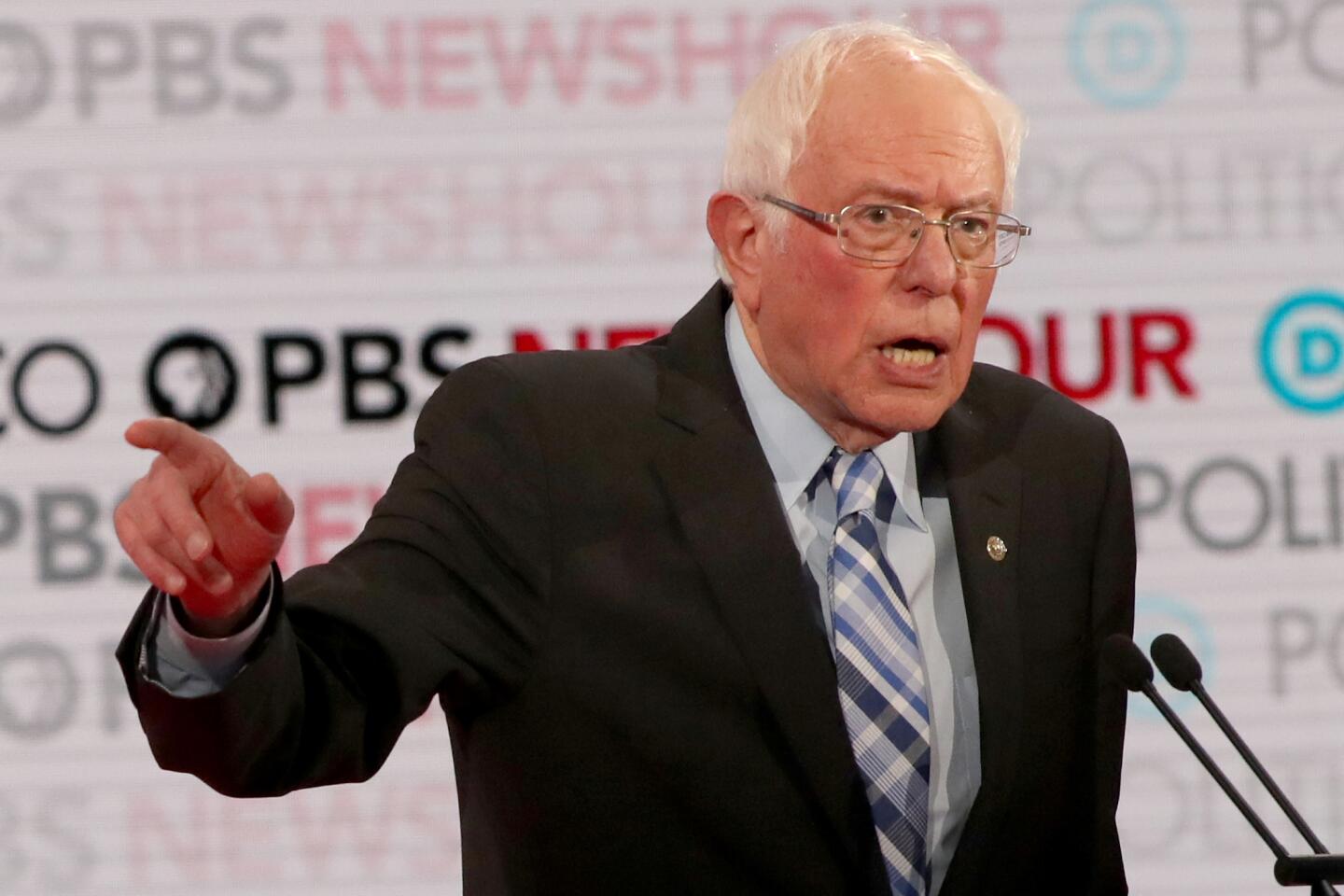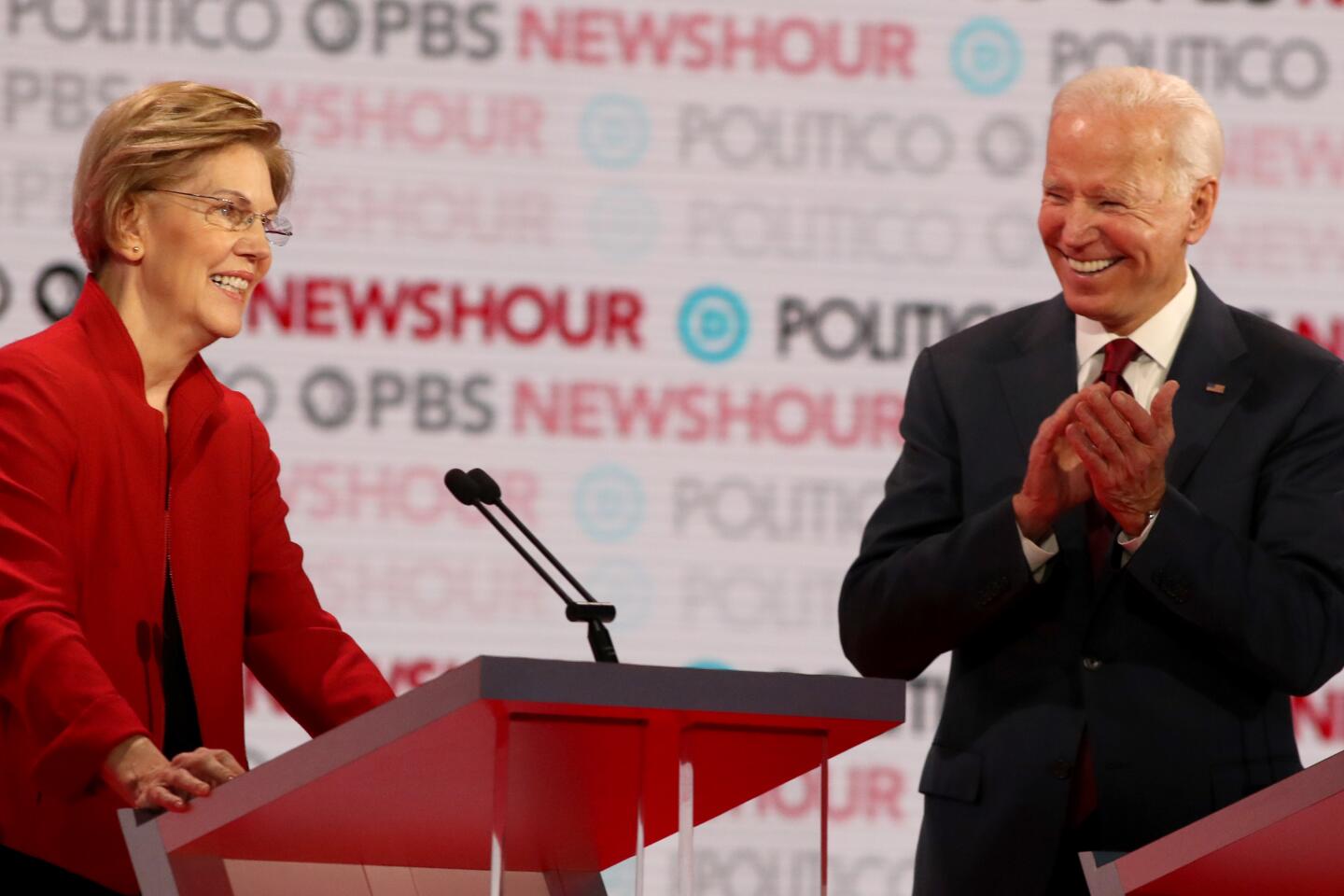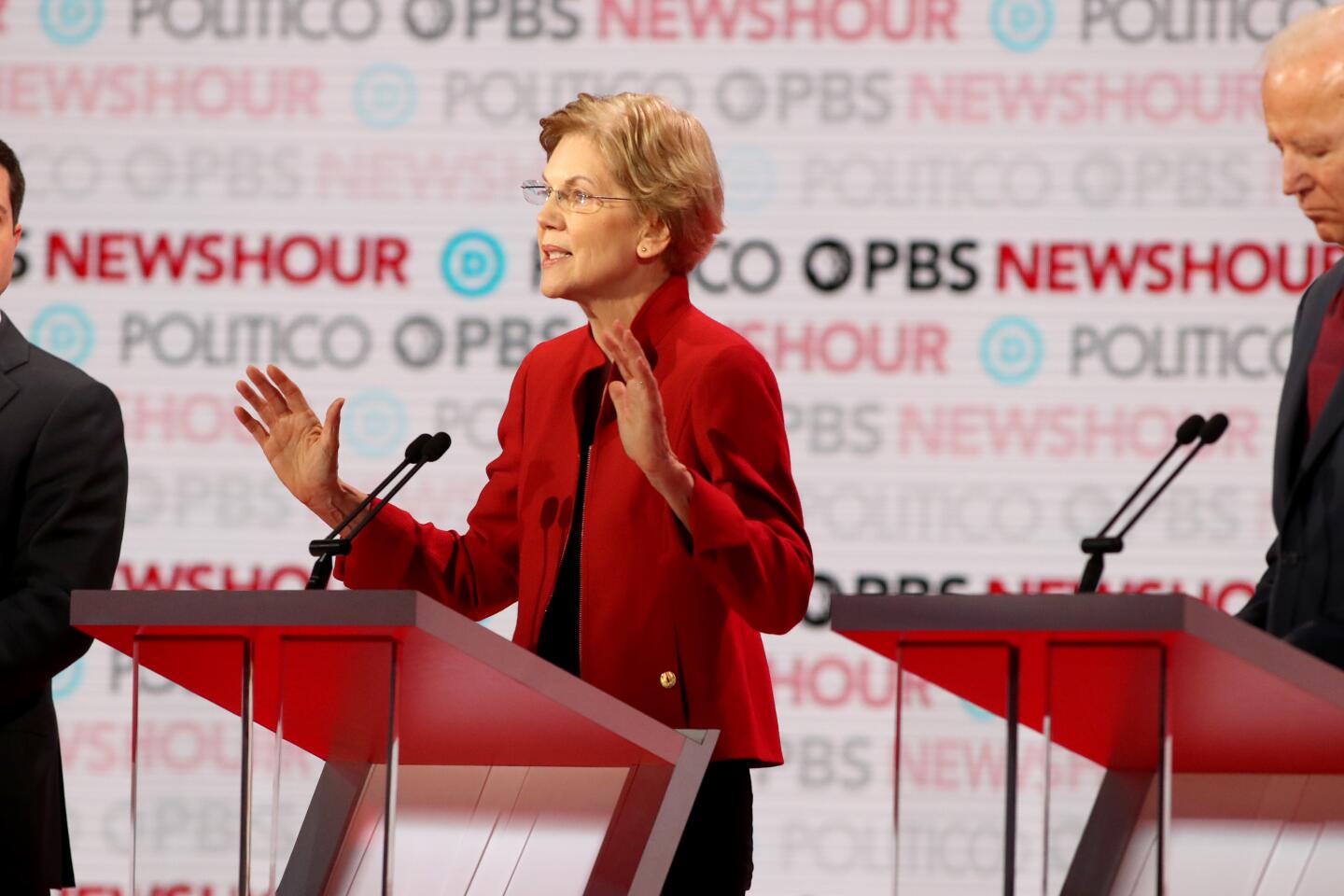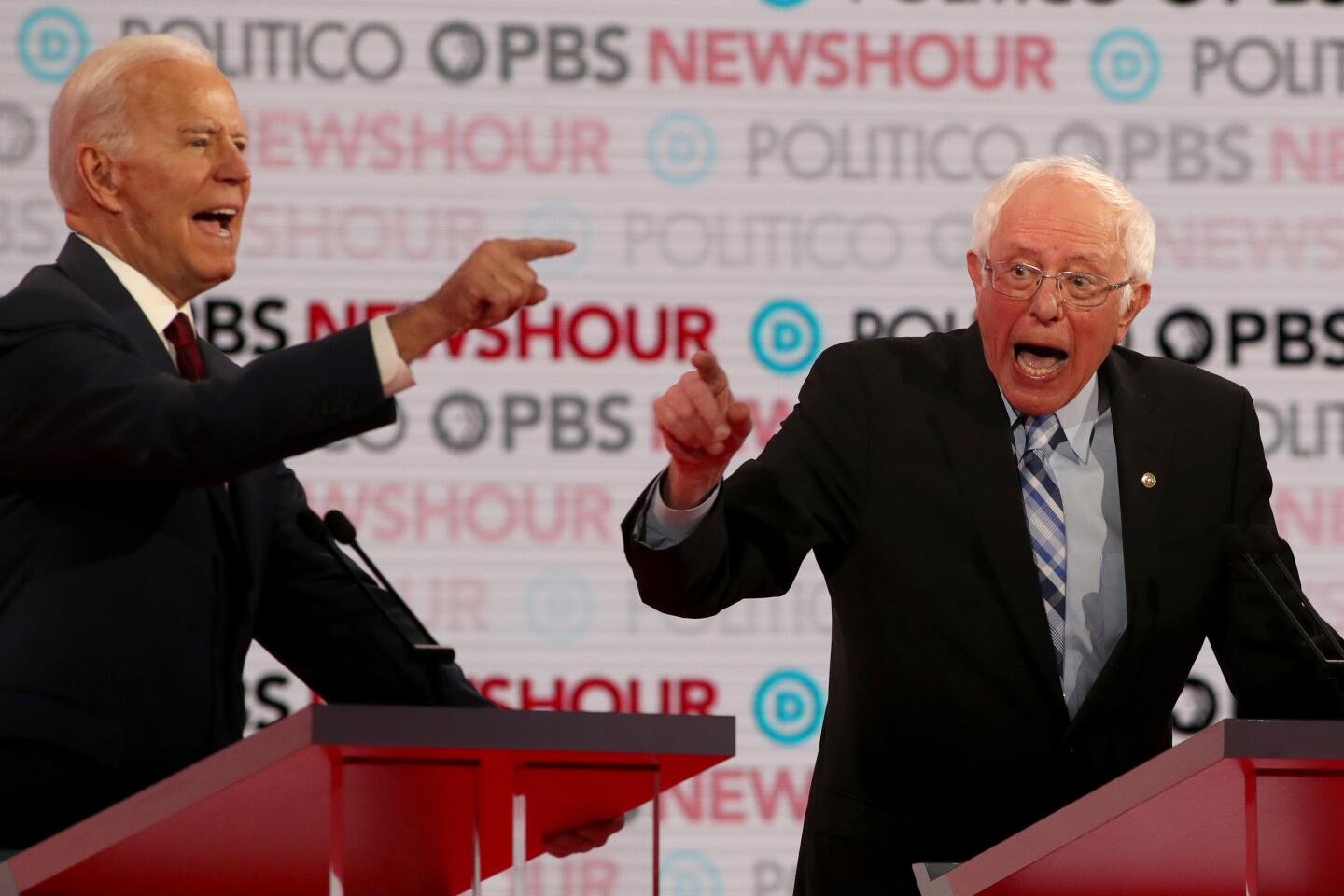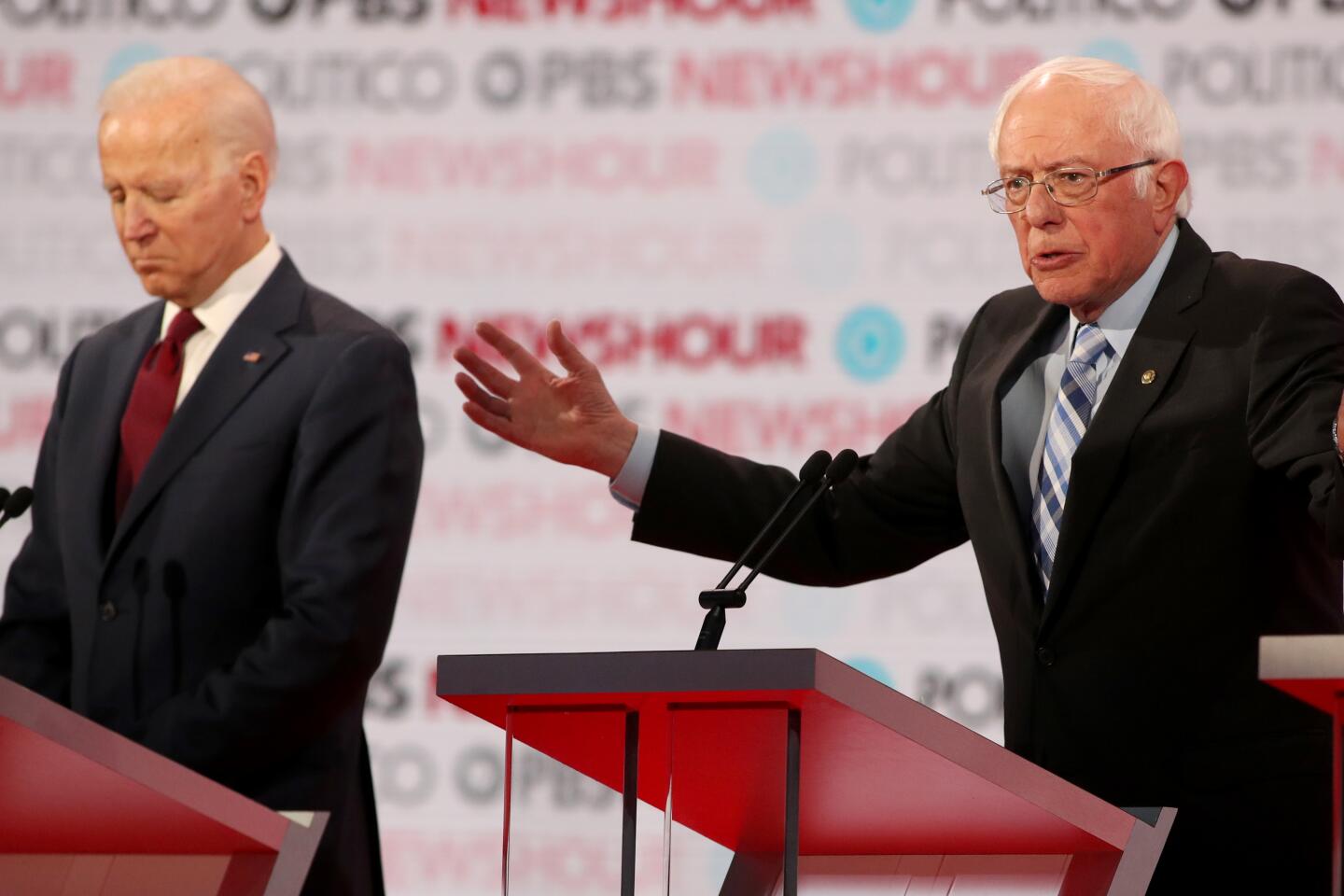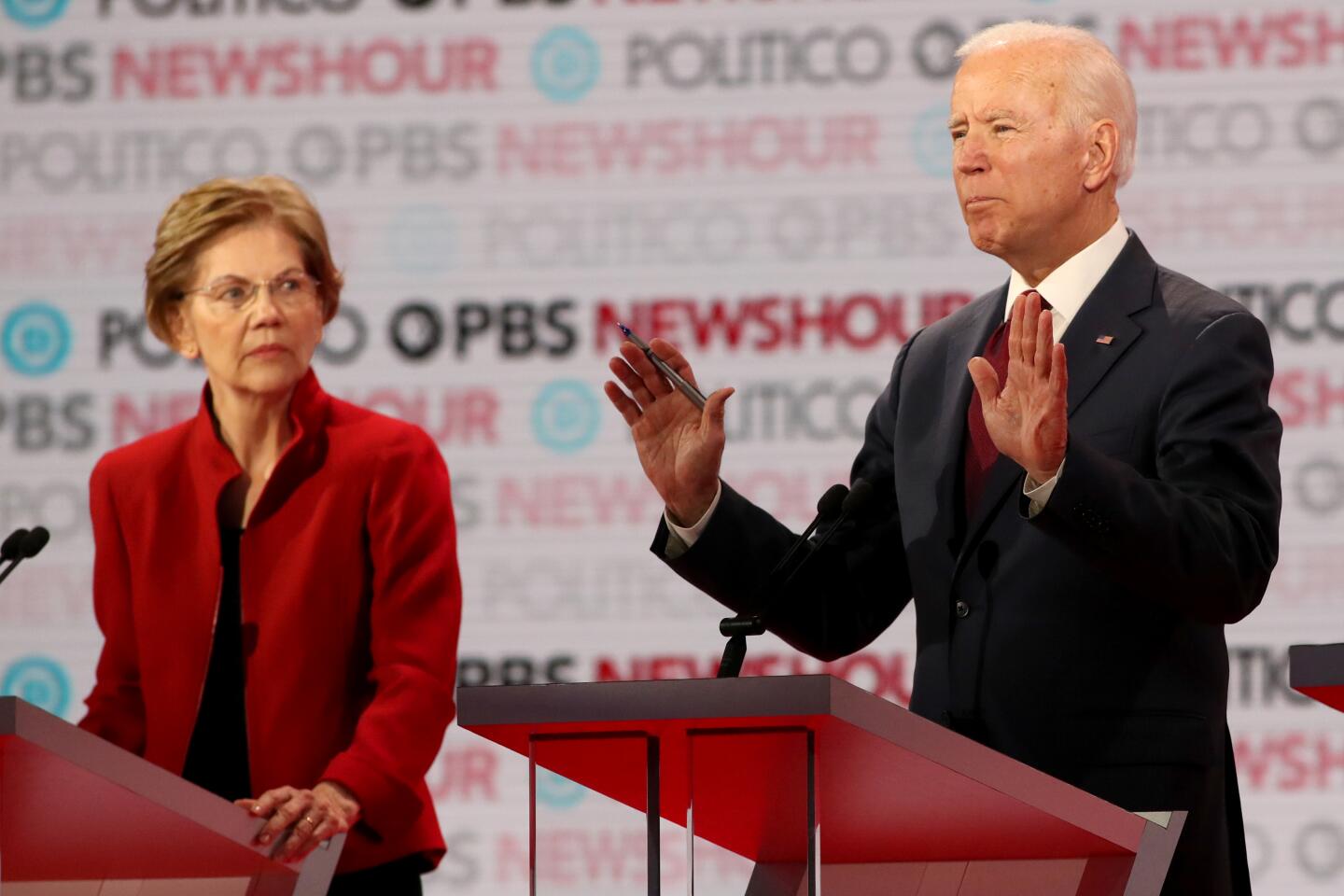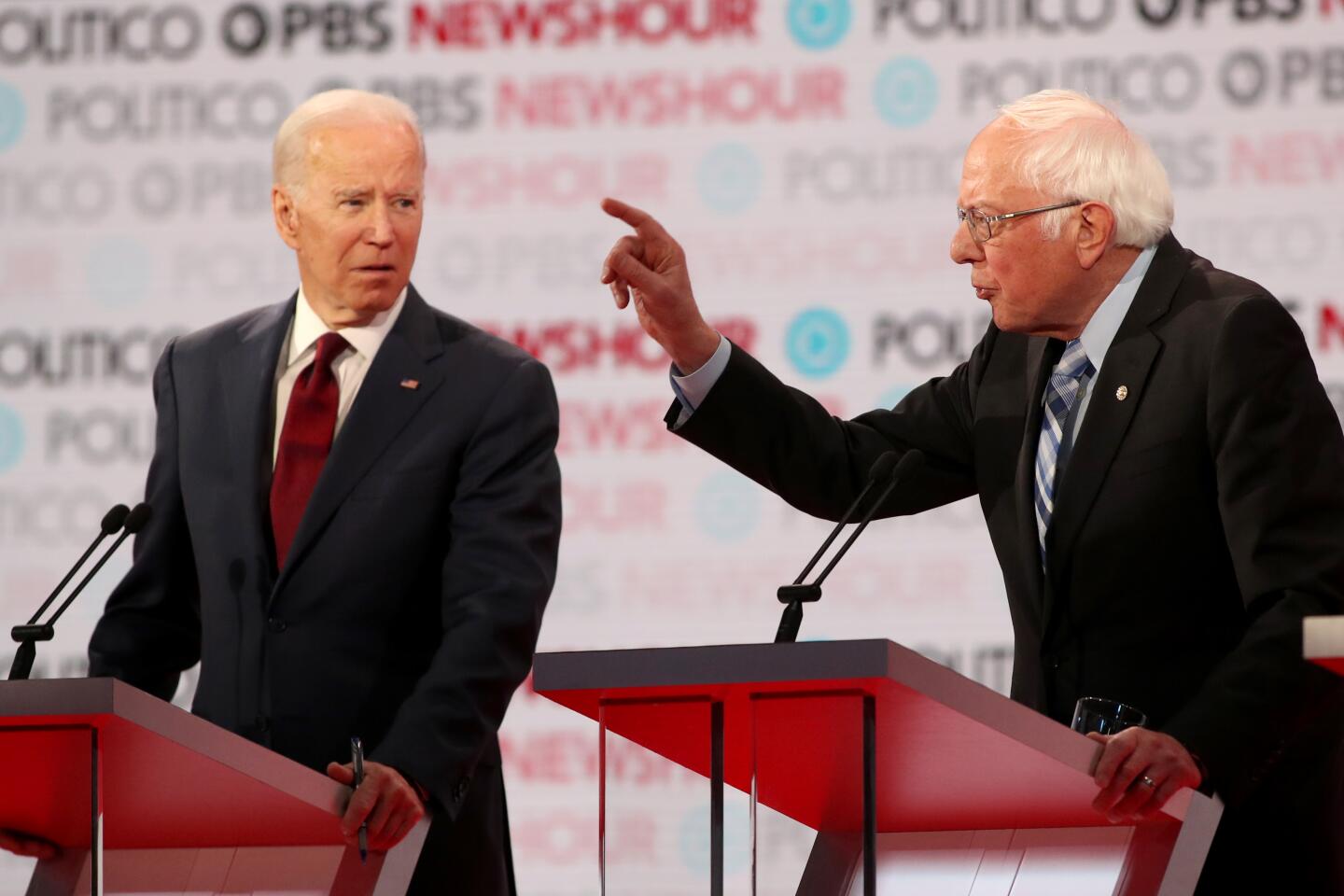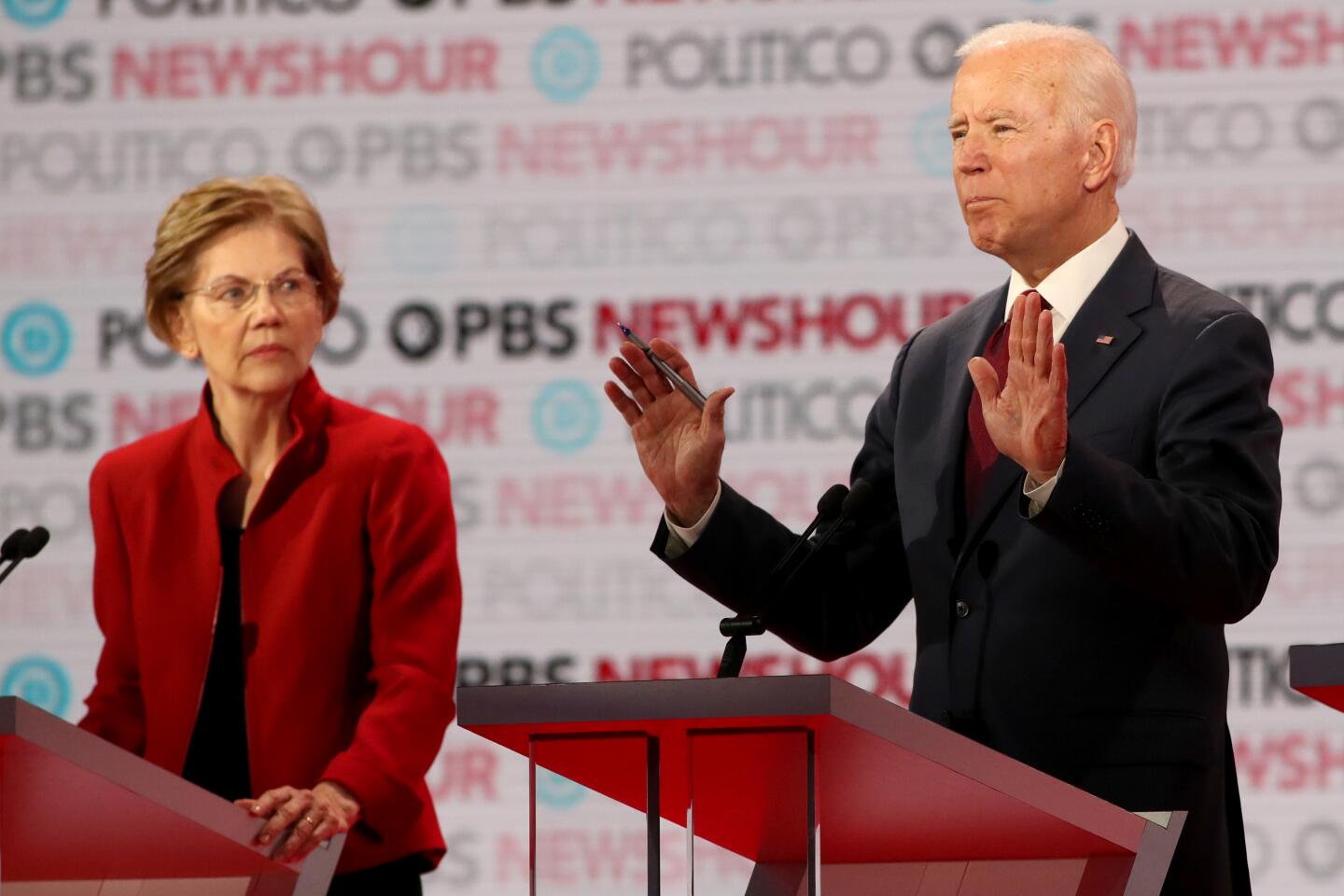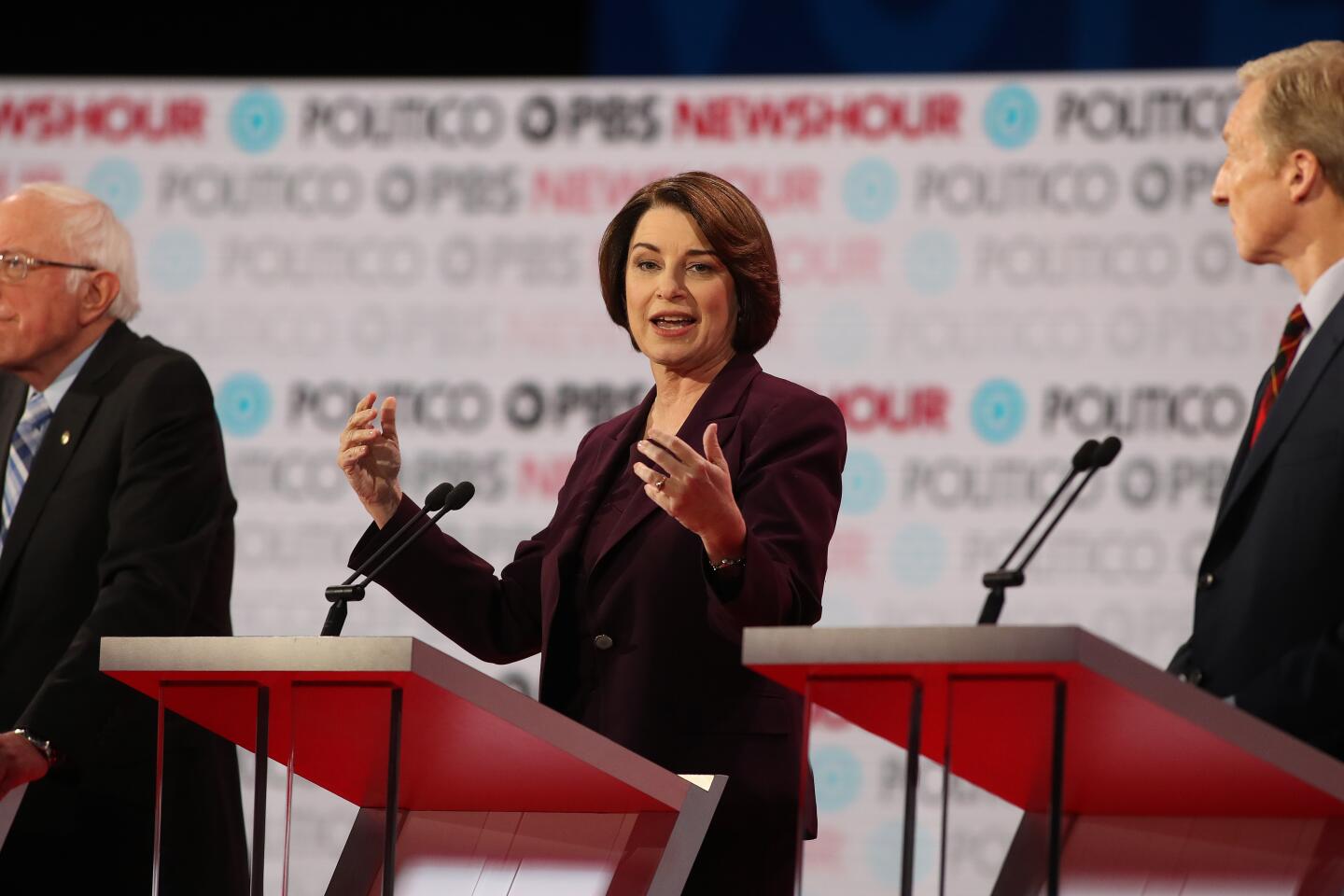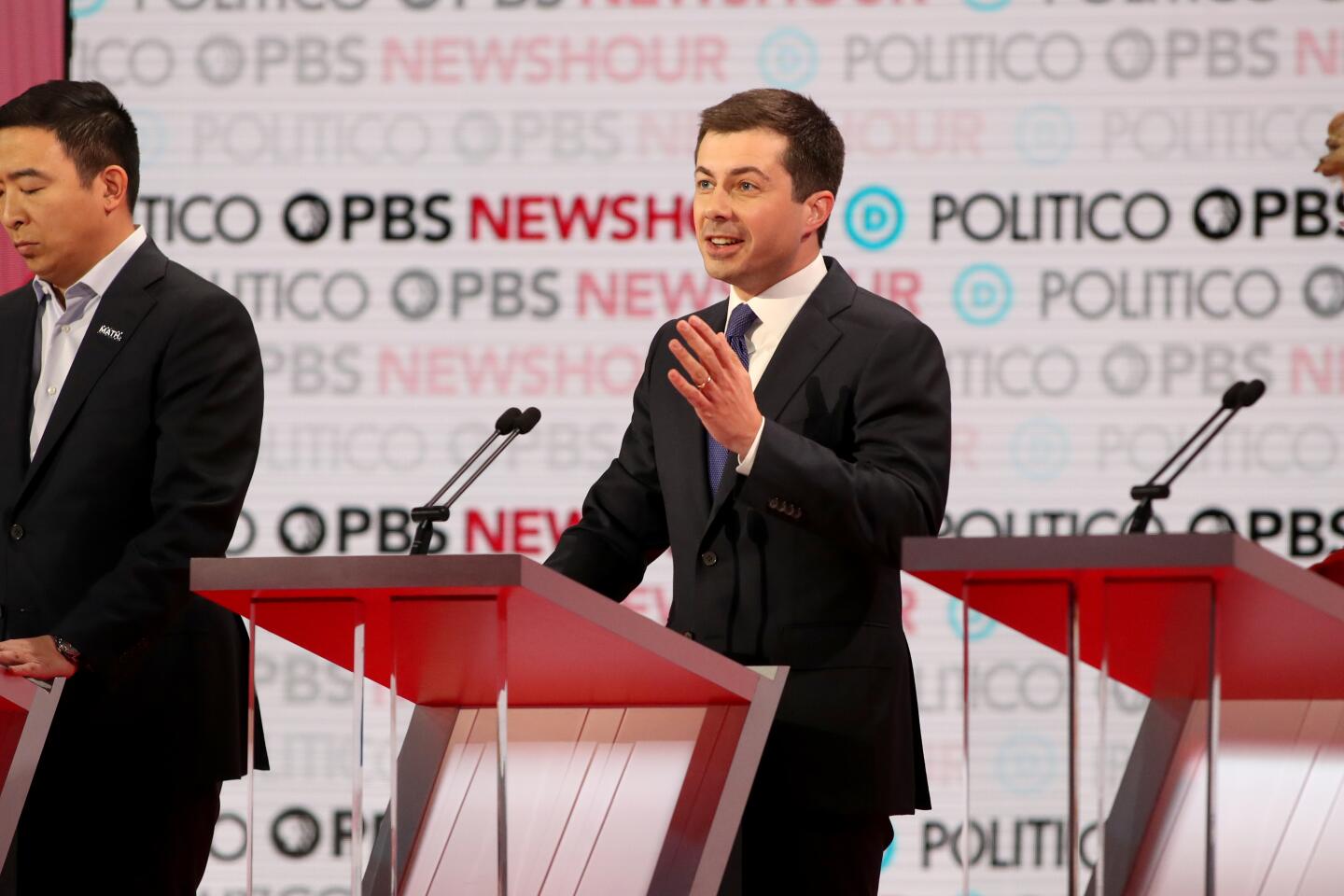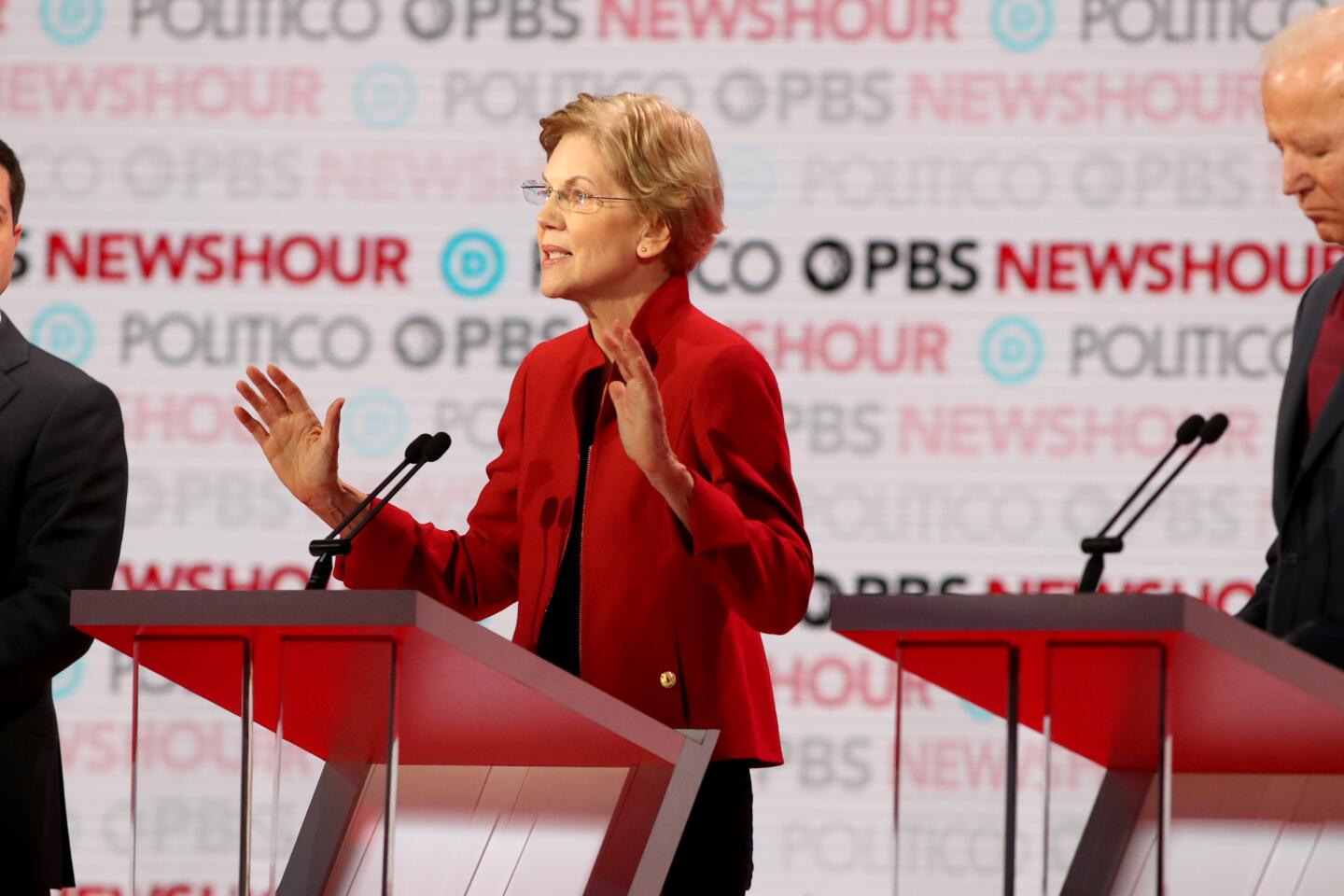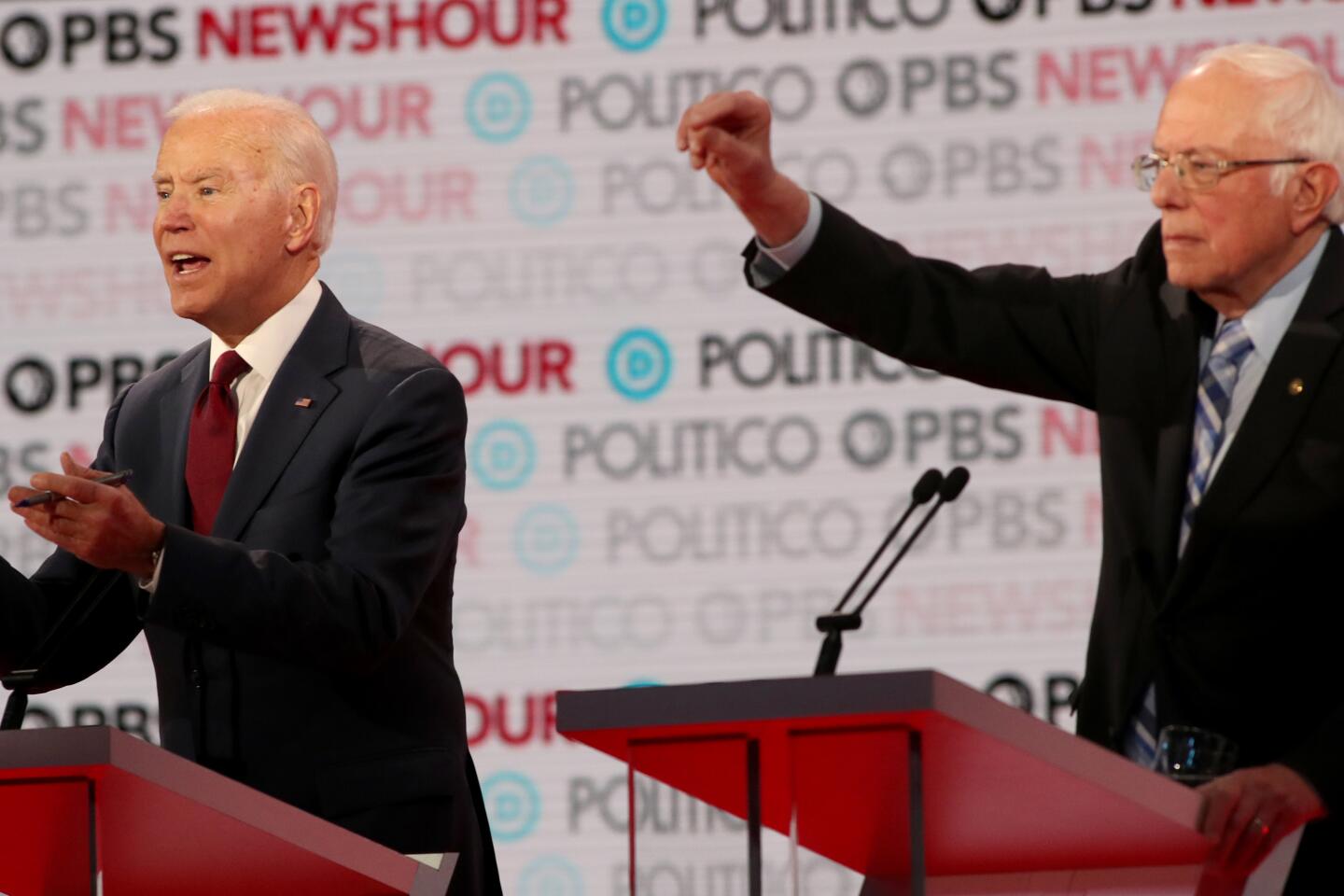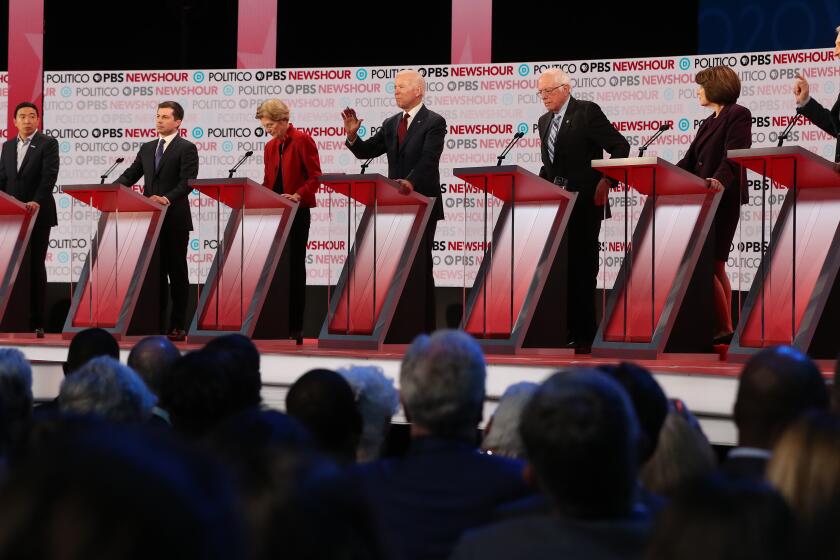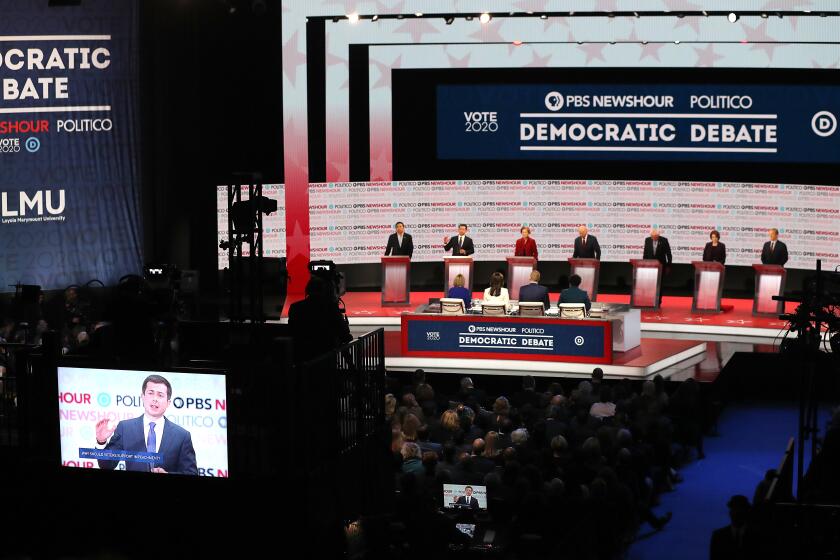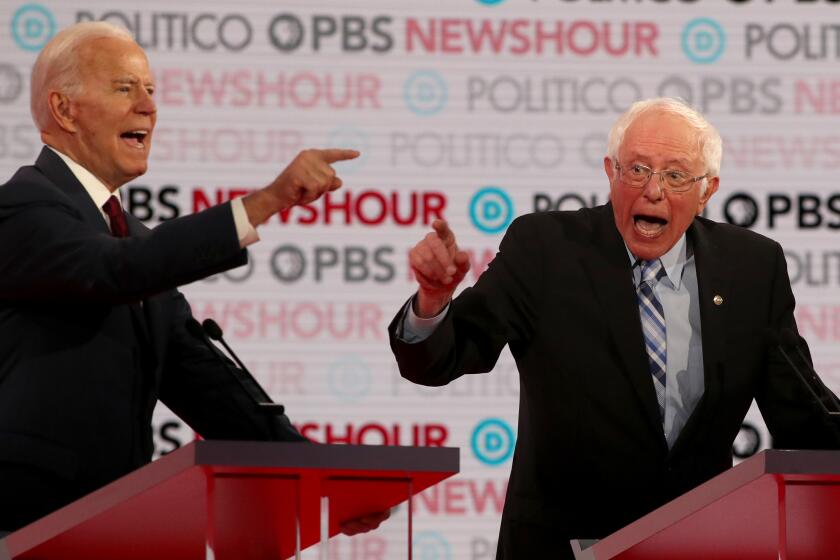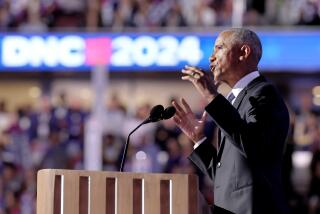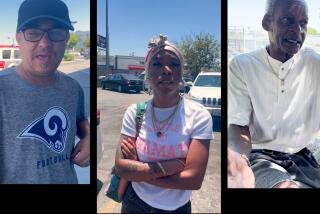Five takeaways from the Democratic debate in Los Angeles

Seven of the party’s White House hopefuls laid aside notions of peace on Earth and good will toward man — and woman — to joust in the year’s sixth and final presidential debate.
- Share via
Brightly wrapped presents, holiday cheer and a crackling discussion of healthcare and income inequality.
Democrats certainly know how to celebrate the spirit of the season!
On Thursday night, seven of the party’s White House hopefuls laid aside notions of peace on Earth and goodwill toward man — and woman — to joust in the year’s sixth and final presidential debate, a testy back-and-forth on the campus of Los Angeles’ Loyola Marymount University.
As the year winds down and the first balloting — on Feb. 3 in Iowa — rapidly approaches, here are five takeaways from the evening’s antidote to all that gauzy yuletide sentiment.
Money, money, money
Once again, it was Pete Buttigieg‘s turn in the (wine) barrel.
For the second debate in a row — this time with more vehemence — the 37-year-old mayor of South Bend, Ind., came under attack after emerging as a top contender in the campaign’s opening contests in Iowa and New Hampshire.
The chief antagonist was Massachusetts Sen. Elizabeth Warren, who shed her refusal to speak no evil of fellow Democrats as her campaign lost altitude throughout the fall. She seized on Buttigieg’s recent appearance at an opulent Napa fundraiser to jab at his high-dollar fundraising and suggest he is overly beholden to fat-cat donors.
“Billionaires in wine caves should not pick the next president of the United States,” she declared.
Buttigieg, abandoning his usual Boy Scout mien, responded that he was the only candidate on stage who is neither a billionaire nor millionaire. He spent much of the evening giving Warren the side-eye.
“This is the problem with issuing purity tests you yourself cannot pass,” Buttigieg snapped as his supporters whooped, a reference to Warren’s transfer of Senate funds — raised under generous contribution guidelines — to a presidential campaign she is waging without high-dollar events.
Others jumped in for much discussion of affluence, the fruit of the vine and other signs of conspicuous consumption, which continued until Tom Steyer — a billionaire, as it were — noted the person happiest at all the sniping was a certain well-to-do denizen of the White House.
Biden’s best
Former Vice President Joe Biden has struggled in previous outings, his performance ranging from not bad (graded on a curve) to cringe-inducing.
For the most part, his responses were crisp and on point, especially when he parried a question about his age and a suggestion President Obama, his former partner in the White House, made earlier this week that “old men” should “get out of the way” for a new generation of leaders.
Moderator Tim Alberta of Politico ventured that Obama probably hadn’t run the remarks past Biden’s campaign.
“I’m guessing he didn’t have me in mind, either,” Biden shot back.
On the debate stage at Loyola Marymount University, Democrats described climate change as an existential threat — and said tackling it was a cause that could bring the country together.
He then deftly handled a query on whether he would pledge to seek a second term as president, dispensing with rumors he might not seek reelection as a way to assuage voter concerns about his age.
“I’m not committed one way or the other,” the 77-year-old Biden said, noting he hasn’t even been elected to one term. “Let’s see what happens.”
Impeachment? Next.
A day after the House passed two articles of impeachment against President Trump, a discussion of the vote — at once epic and anticlimactic — could not be avoided, even if candidates would have preferred to bat about other issues.
There is, after all, not a smidgen’s difference in their contempt for the incumbent, leaving other areas much riper to plumb their disagreements.
When impeachment came up as the very first question, the presidential hopefuls used the opportunity to pivot as best they could to the main themes of their campaigns.
Buttigieg, running as a Beltway outsider, said the presidential campaign presents “our opportunity ... no matter what happens in Washington, to change the course of the nation for the better.”
Democratic presidential candidates struggled to explain why more voters do not support impeachment and removal of Trump. Several sidestep the question.
Sen. Bernie Sanders of Vermont spoke of Trump breaking his promise to lift up working-class Americans, saying his campaign would be a fight to protect programs such as Medicare and Social Security. Warren sounded familiar notes on fighting corruption and remaking an economy stacked in favor of the well-to-do.
The issue was particularly pertinent for Sanders, Warren and the third senator on stage, Minnesota’s Amy Klobuchar, all of whom will swear an oath to “do impartial justice” as they weigh whether Trump should be removed from office a mere 10 months from election day.
They left little doubt where they stood. If Trump “is so innocent,” Klobuchar taunted, then “why doesn’t he have all the president’s men testify?” — an allusion to the partisan dispute at the heart of the Senate trial.
California blackout
There was reference to the wildfire that destroyed the town of Paradise, Calif., and mention of the state’s majority-minority status, a harbinger of where the rest of the country is headed.
Klobuchar delivered a shout-out to Gov. Gavin Newsom, seated in the studio audience.
But as far as playing to the hometown crowd, that was pretty much the extent of courting Californians.
The debate was held in Los Angeles in recognition of the state’s March 3 primary. It is, in the political vernacular, the Big Enchilada on Super Tuesday, when 14 states will vote in a coast-to-coast blitz of balloting.
Joe Biden and Bernie Sanders clashed over “Medicare for all” on the debate stage, with Biden saying it is unrealistic and Sanders accusing the former vice president of championing the status quo.
The setting invited the moderators and candidates to address one of California’s perpetual gripes, the notion the state and issues that touch residents from Yreka to Yucaipa are forever ignored as White House contestants minister to the whims of voters in (comparatively small) Iowa and New Hampshire.
They largely passed up the chance.
The debates are broadcast nationwide and carried around the world via the internet. They take place on a sound stage, all razzled-dazzled in red, white and blue, which could just as well be situated in Bowling Green, Ky., or Grand Forks, N.D.
Given the scant discussion Thursday night of California issues, it may as well have been.
Fewer but long
The debate was the most slimmed-down version yet — not even enough candidates to field a softball team.
But the format was a stamina-sapping 2 1/2-hour endurance test.
A traveler could have flown from Oakland to Burbank and almost all the way back in the time candidates spent on stage. When it was over, viewers might have felt as though they’d been crammed the whole time between two persistently chatty, arm rest-hogging seatmates.
The good news is no debates are scheduled for the next three-plus weeks. Then brace yourself, as the candidates are set to meet face to face four times between Jan. 14 and Feb. 25.
In the meantime, ho ho ho.
More to Read
Get the L.A. Times Politics newsletter
Deeply reported insights into legislation, politics and policy from Sacramento, Washington and beyond. In your inbox three times per week.
You may occasionally receive promotional content from the Los Angeles Times.

